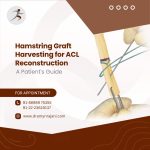The human body is full of surprises, and one of them is the fabella bone. While it’s not widely known, the fabella is a small sesamoid bone found at the back of the knee, embedded in the tendon of the lateral head of the gastrocnemius muscle. It’s not present in everyone, but studies suggest that its prevalence is increasing globally. Despite its relatively small size, the fabella can have a significant impact on knee health, especially for individuals dealing with knee pain or undergoing knee replacement surgery. In this blog, we’ll explore what the fabella bone is, why it’s important, and how it can affect your knee. We’ll also discuss when it’s essential to seek advice from a knee specialist in Mumbai or an orthopaedic surgery specialist in Mumbai for proper diagnosis and treatment.
What is the Fabella Bone?
The fabella is a small, pea-shaped bone located behind the knee, within the tendon of the lateral head of the gastrocnemius (calf) muscle. It's classified as a sesamoid bone, meaning it forms within a tendon to provide added protection and support. This type of bone is similar to the patella (kneecap), though much smaller in size.
Interestingly, the presence of the fabella bone is not universal. In fact, not everyone has a fabella, and its presence can vary across populations. Some studies have suggested that it is more common in certain ethnic groups and may be influenced by genetic or environmental factors. While the exact function of the fabella remains unclear, it is believed to help with the movement of the tendon and reduce friction during knee flexion.
The Growing Prevalence of the Fabella
Historically, the fabella was thought to be relatively rare. However, research has shown that its prevalence is increasing. According to a 2019 study, the incidence of fabella bones has tripled over the past century. This could be due to factors such as better diagnostic imaging technology or changes in human lifestyle and health.
While the fabella is often asymptomatic and goes unnoticed in many people, it can sometimes cause knee pain or complications, particularly during certain movements or in the context of knee surgery. For this reason, its presence matters for patients and medical professionals alike.
How Does the Fabella Affect the Knee?
For most people, the fabella does not cause any problems, and they may never even know they have one. However, in some cases, the fabella can contribute to knee pain and other issues, particularly in individuals who are physically active or those who have experienced knee trauma. Conditions associated with the fabella include:
-
Fabella Syndrome
Fabella syndrome occurs when the fabella irritates surrounding tissues, including the lateral femoral condyle (a bony prominence on the thigh bone) or the tendons that surround it. This condition can cause pain at the back of the knee, particularly during activities like walking, running, or bending the knee. Fabella syndrome is relatively rare but can be a source of chronic knee pain in some individuals.
-
Knee Osteoarthritis
The fabella has been found to be more prevalent in individuals with knee osteoarthritis, particularly those who experience cartilage degeneration. While it’s not entirely clear whether the fabella contributes to the development of osteoarthritis or is simply a byproduct of the condition, its presence can complicate treatment.
-
Complications in Knee Surgery
For individuals undergoing knee joint replacement surgery, the fabella can pose a challenge. Its location behind the knee can interfere with certain surgical procedures, and in some cases, surgeons may need to remove the fabella to ensure a successful outcome. Patients undergoing orthopaedic surgery in Mumbai should be aware of this potential complication and discuss it with their surgeon before undergoing surgery.
Diagnosis and Treatment of Fabella-Related Knee Issues
If you experience pain at the back of your knee, particularly during flexion or weight-bearing activities, the fabella could be the culprit. To diagnose fabella-related knee problems, a knee specialist in Mumbai may perform a combination of physical examinations and imaging studies such as X-rays, MRIs, or CT scans.
Once diagnosed, treatment options for fabella-related knee pain can vary based on the severity of the condition:
- Conservative Treatment: For mild cases of fabella syndrome, conservative treatment methods such as rest, anti-inflammatory medications, physical therapy, and cortisone injections may help alleviate pain and reduce inflammation. Physical therapy can focus on stretching and strengthening exercises to minimize irritation around the fabella.
- Surgical Treatment: In cases where conservative treatments fail to provide relief, surgery may be necessary. A joint replacement surgeon in Mumbai might recommend fabella excision, where the fabella bone is surgically removed to relieve pressure and pain. In cases of knee replacement surgery, the fabella may be removed preemptively to prevent complications.
Preventing Fabella-Related Knee Pain
While it’s not always possible to prevent the formation or growth of the fabella, there are steps you can take to reduce your risk of knee pain associated with this small bone:
- Maintain a Healthy Weight: Excess weight can put added pressure on your knees and exacerbate issues like fabella syndrome.
- Stay Active: Regular physical activity, particularly exercises that strengthen the muscles around the knee, can help support the joint and reduce the risk of knee pain.
- Listen to Your Body: If you experience pain behind your knee, don’t ignore it. Early diagnosis and treatment can prevent more severe complications down the line.
- Consult an Orthopaedic Surgeon: If you have persistent knee pain, it’s essential to consult with orthopaedic surgery specialists in Mumbai who can assess your condition and recommend appropriate treatment options.
The Role of a Knee Specialist in Managing Fabella Issues
If you suspect that your knee pain is related to the fabella or another underlying condition, consulting a knee specialist in Mumbai is crucial. A specialist will evaluate your symptoms, perform necessary diagnostic tests, and develop a treatment plan tailored to your specific needs. Whether you require conservative management or surgical intervention, early diagnosis and treatment are key to preventing long-term knee problems.
Dr. Amyn Rajani: Leading Knee Specialist and Joint Replacement Surgeon in Mumbai
When it comes to knee health, seeking the expertise of an experienced specialist is essential. Dr. Amyn Rajani, a renowned knee joint replacement surgeon in Mumbai, has extensive experience in diagnosing and treating complex knee conditions, including fabella-related issues. Dr. Rajani specializes in both conservative and surgical treatment options, including advanced knee replacement procedures. With a patient-centered approach, he is committed to providing personalized care and ensuring the best possible outcomes for his patients. If you're experiencing knee pain or require expert advice on knee surgery, consult Dr. Amyn Rajani for a comprehensive assessment and treatment plan.
For more information or to book a consultation with Dr. Amyn Rajani, visit OAKS clinic at Hughes Road, Mumbai or website www.dramynrajani.com or simply call on Clinic Number 91-88989 75355 / 91-22-23619137 to take the first step towards a pain-free future.




